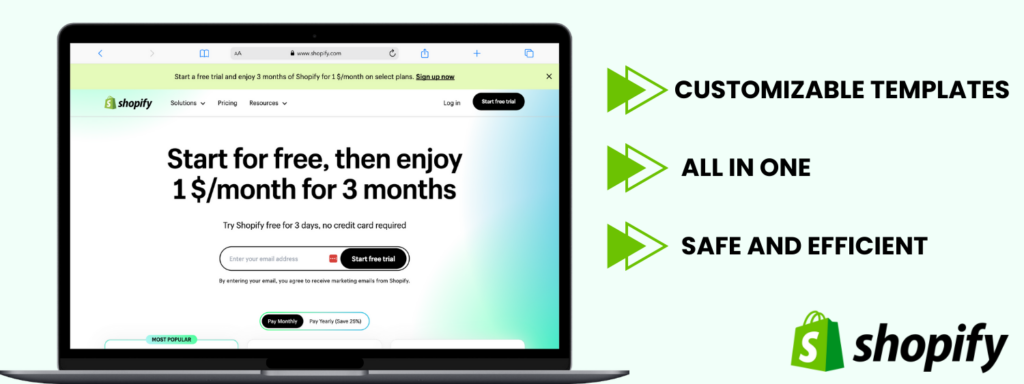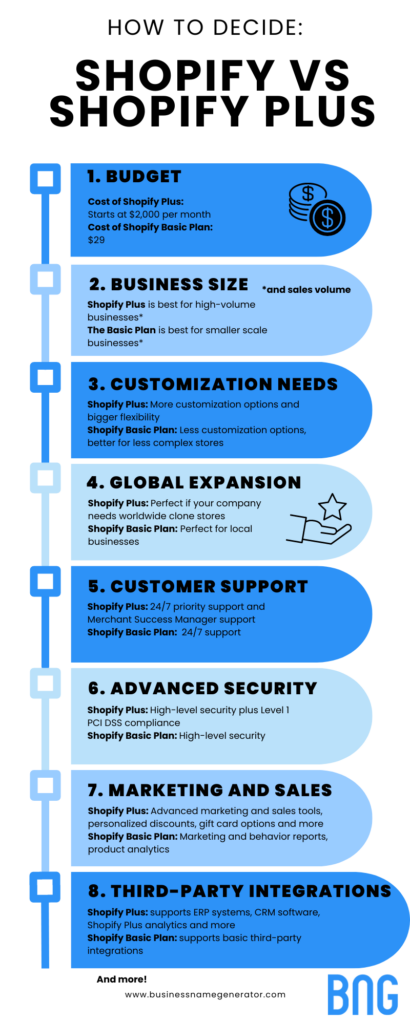In the ever-evolving landscape of e-commerce, choosing the right platform for your business can make all the difference. As we venture into 2023, Shopify remains a dominant force, but the distinction between Shopify and Shopify Plus has left many entrepreneurs puzzled.
Whether you’re a startup or an established brand, understanding the key differences between these two powerhouses is crucial. Dive deep with us as we demystify the nuances of Shopify vs. Shopify Plus, ensuring you make an informed decision tailored to your online business needs.
Shopify vs. Shopify Plus: Major Differences
Are you having a hard time choosing between Shopify and Shopify Plus and are confused about its features? Both are powerful tools, yet they cater to different types of businesses, based on their needs, size, and budget. In this section, you will learn all about the key differences:
Shopify, suitable for small to medium-sized businesses, offers a broad range of features and capabilities that will help you get started with online selling. From user-friendly interfaces to a multitude of themes and plugins, Shopify makes online store creation and management easy and efficient.
Shopify Plus, on the other hand, is designed to serve high-volume retailers and larger enterprises. If your business caters to an international audience or handles a large volume of transactions, Shopify Plus offers scalability and customization to a degree that the standard Shopify platform doesn’t.

Here is a snapshot of the major differences:
| Shopify | Shopify Plus | |
|---|---|---|
| Pricing | Starts at $29/month | Starts at $2000/month |
| Support | 24/7 Support | Dedicated Launch Engineer |
| Customization | Limited | Advanced |
| Scalability | Ideal for Small to Medium Businesses | Ideal for Large Enterprises |
| International Capabilities | Limited | Clone stores for different regions |
| Staff Accounts | Limited | Unlimited |
| API Integration | Limited | Advanced |
| Apps | Some apps available | Extra apps available |
| Analytics | Basic | Advanced |
When deciding between Shopify and Shopify Plus, it’s important to understand your business needs and growth plans. Weigh the costs against the benefits – while Shopify Plus is more expensive, its extensive features could drive higher sales and profit. However, if you’re a smaller business or just starting, Shopify’s lower-tier plans might provide the best value for your needs.
MORE: How to Open a Shopify Store
How to Decide Between Shopify and Shopify Plus
When deciding, consider the following elements:
Budget
Shopify Plus starts at $2,000 per month, a significant jump from Shopify’s basic plan at $29 per month. Evaluate your financial readiness for the investment. Shopify Plus pricing is definitely much more demanding, but the investment is well worth it for larger businesses.
MORE: How Much Does a Shopify Store Cost?
Business Size and Sales Volume
High-volume businesses that require greater scalability might benefit from Shopify Plus. If your operations are currently small to medium scale, Shopify might suffice. The basic Shopify plan is best for businesses that work on a smaller scale, and don’t need to use as many features as bigger Shopify stores.
Customization Needs
For your Shopify store, branding is important and if your business requires complex customization, Shopify Plus provides more flexibility compared to the standard Shopify. The standard Shopify plan offers less customization.
Remember that a successful Shopify store needs a good name — check out what options are available on Shopify Business Name Generator and register your Shopify store domain name.
Global Expansion
A standout feature of Shopify Plus is its ability to offer clone stores. These clones enable businesses to tailor each store to a specific region or country. Each clone can have its domain, language, currency, and products, enabling businesses to cater to the distinct preferences and nuances of each market.
Managing inventory and shipping across multiple regions can be streamlined with clone stores. Businesses can integrate with local fulfillment centers or dropshipping providers, ensuring faster delivery times and potentially reduced shipping costs.
In essence, Shopify Plus’s approach to global expansion, through its clone store feature, allows businesses to plant their roots in new markets efficiently. It ensures they’re equipped to offer a truly localized shopping experience while streamlining backend operations.
Customer Support
Shopify Plus support offers customers access to a dedicated support team, which includes a Merchant Success Manager and 24/7 priority support. If having a dedicated support team is crucial for your business operations, Shopify Plus might be the right choice. The standard Shopify plan still offers customer support; the main difference is that the Merchant Success Manager is not available for Shopify standard plan.
Advanced Security
While both Shopify and Shopify Plus provide high-level security, Shopify Plus has additional features like Level 1 PCI DSS compliance, which is essential if you’re dealing with high volumes of transactions.
Automation Capabilities
While both Shopify and Shopify Plus offer automation capabilities, Shopify Plus stands out with advanced, built-in tools designed for larger, more complex businesses. Its features such as Script Editor and Launchpad provide comprehensive automation options tailored for a more seamless and scalable e-commerce operation.
On the other hand, while standard Shopify provides fundamental automation, it might necessitate more third-party integrations or manual tasks for advanced needs.
Marketing & Sales Features
Shopify Plus provides advanced marketing and sales tools such as personalized discounts, gift card options, and much more. These could be advantageous for businesses aiming to drive more conversions and customer loyalty. In the standard plan, you will find marketing and behavior reports as well as product analytics.
MORE: How to Brand Your Shopify Store
Wholesale/B2B Operations
Shopify Plus comes with a separate, password-protected wholesale store, which you can use to sell in bulk to other businesses. If you anticipate a significant B2B component in your operations, this might be a significant point in favor of Shopify Plus.
Third-Party Integrations
Both platforms support integrations with third-party apps, but Shopify Plus supports a broader range of high-level integrations, such as ERP systems, CRM software, the merchant success program, additional dashboards, Shopify Plus analytics tools and more.
MORE: learn how Shopify reports work

Pros and Cons of Shopify Vs Shopify Plus
Before you make your final decision whether to choose Shopify or Shopify Plus, make sure to check out this list of pros and cons between the two plans:
| Shopify | Shopify Plus | |
|---|---|---|
| Pros | User-friendly interface. | Enhanced customization capabilities. |
| Affordable for small businesses. | Advanced features for scalability. | |
| Quick setup & simple integrations. | Priority customer support. | |
| Reliable security features. | Multiple stores with one dashboard. | |
| Suitable for new businesses. | Automation tools for efficiency. | |
| Cons | Limited customization options. | Higher monthly cost. |
| Might lack scalability for larger businesses. | Might be overly complex for small businesses. | |
| Transaction fees if not using Shopify Payments. | Requires more management and setup due to advanced features. | |
| Limited number of staff accounts. |
MORE: How to customize your store with the best Shopify themes
Takeaway Points
Whether Shopify or Shopify Plus is best for your business comes down to the desired customization, expansion goals, customer service preferences, and other business needs. Considering these factors will help you choose the platform that fits with your aspirations and growth plans for 2023.
To build a unique Shopify brand, you will need the perfect name for your business. Using our Shopify Name Generator, you can generate thousands of options for choosing and registering a unique name that will ensure the success of your business.